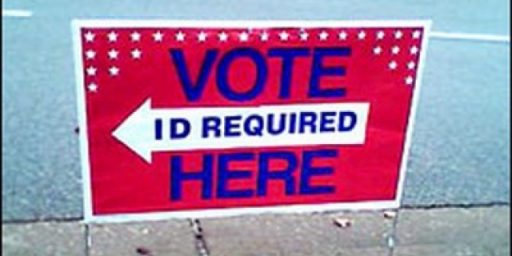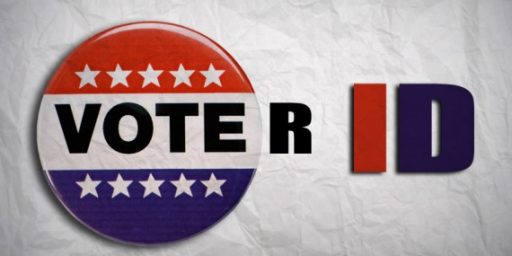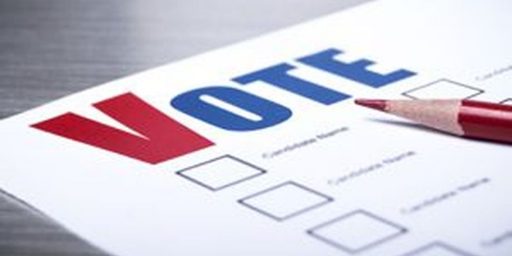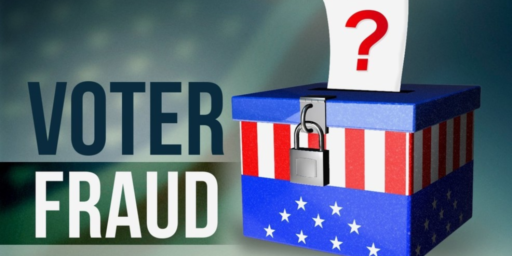Justice Department Blocks South Carolina Voter ID Law
Late yesterday, the Dept. of Justice announced that it was blocking implementation of South Carolina’s tough new Voter ID law:
The Obama administration entered the fierce national debate over voting rights, rejecting South Carolina’s new law requiring photo identification at the polls and saying it discriminated against minority voters.
Friday’s decision by the Justice Department could heighten political tensions over eight state voter ID statutes passed this year, which critics say could hurt turnout among minorities and others who helped elect President Obama in 2008. Conservatives and other supporters say the tighter laws are needed to combat voter fraud.
Justice Department lawyers, facing intense pressure from civil rights groups to act against the new laws, are still reviewing Texas’s statute.
In its first decision on the laws, Justice’s Civil Rights Division said South Carolina’s statute is discriminatory because its registered minority voters are nearly 20 percent more likely than whites to lack a state-issued photo ID. Under the 1965 Voting Rights Act, South Carolina is one of a number of states that are required to receive federal “pre-clearance” on voting changes to ensure that they don’t hurt minorities’ political power.
“The absolute number of minority citizens whose exercise of the franchise could be adversely affected by the proposed requirements runs into the tens of thousands,” Assistant Attorney General Thomas E. Perez said in a letter to South Carolina officials.
South Carolina Gov. Nikki Haley (R) called the decision “outrageous” and said she plans to seek “every possible option to get this terrible, clearly political decision overturned so we can protect the integrity of our electoral process and our 10th Amendment rights.”
The law, passed in May and signed by Haley, requires voters to show one of five forms of photo identification. The state can now try to get the law approved by a federal court or seek reconsideration from Justice.
South Carolina cited the need to fight voter fraud in defending the measure. Whether election fraud exists to any significant degree and how extensive it may be is the subject of a divisive national debate. Some conservatives have long argued that fraud is a serious problem, but Perez said that South Carolina’s submission “did not include any evidence or instance” of fraud not already addressed by state laws.
The federal action — the first time the government has rejected a voter-identification law in nearly 20 years — signals an escalating national legal battle over the laws as the presidential campaign intensifies. The American Civil Liberties Union and another group recently filed a federal lawsuit contending that Wisconsin’s new voter-identification measure is unconstitutional.
Laws approved in Mississippi and Alabama also require federal approval but have not yet been submitted to the federal government. States can get such approval for changes to voting laws from Justice, a federal court in the District or both.
It is unclear if the four states not subject to the Voting Rights Act requirement — Wisconsin, Kansas, Rhode Island and Tennessee — will face challenges to their laws. Justice lawyers could file suit under a different provision of the act, but the department has not revealed its intentions.
It was inevitable that this issue was going to be decided by the Courts anyway, so I suppose its better that it gets fast-tracked in this manner.





The Confederate probationary states showing once again why they need to be kept on a leash.
That voter fraud is about as easy to find as WMD’s in Iraq.
I am of the opinion that requiring photo ID at the booth is fine, so long as that ID can be obtained absolutely free-of-charge by anyone requiring one. Otherwise it would seem to be a de facto poll tax and thus run afoul of the 24th Amendment.
@Neil Hudelson: voter fraud? I live in a small town surrounded by small towns that are controlled by families – been that way for over a century. We follow the old advice “vote early and often”. A town nearby lost its registration books in a fire – in the Civil War! They haven’t replaced them. Several of my neighbors have double registration – for them and their pets! The leaders of these towns don’t want to see any voter id laws.
Why is it ok to demand identification to cash a check, but not ok to require ID for something as important as an election?
@Stone Tools: I agree – and a card is needed to check out library books, to get into the swim club, at many places of work, and a lot of other places.